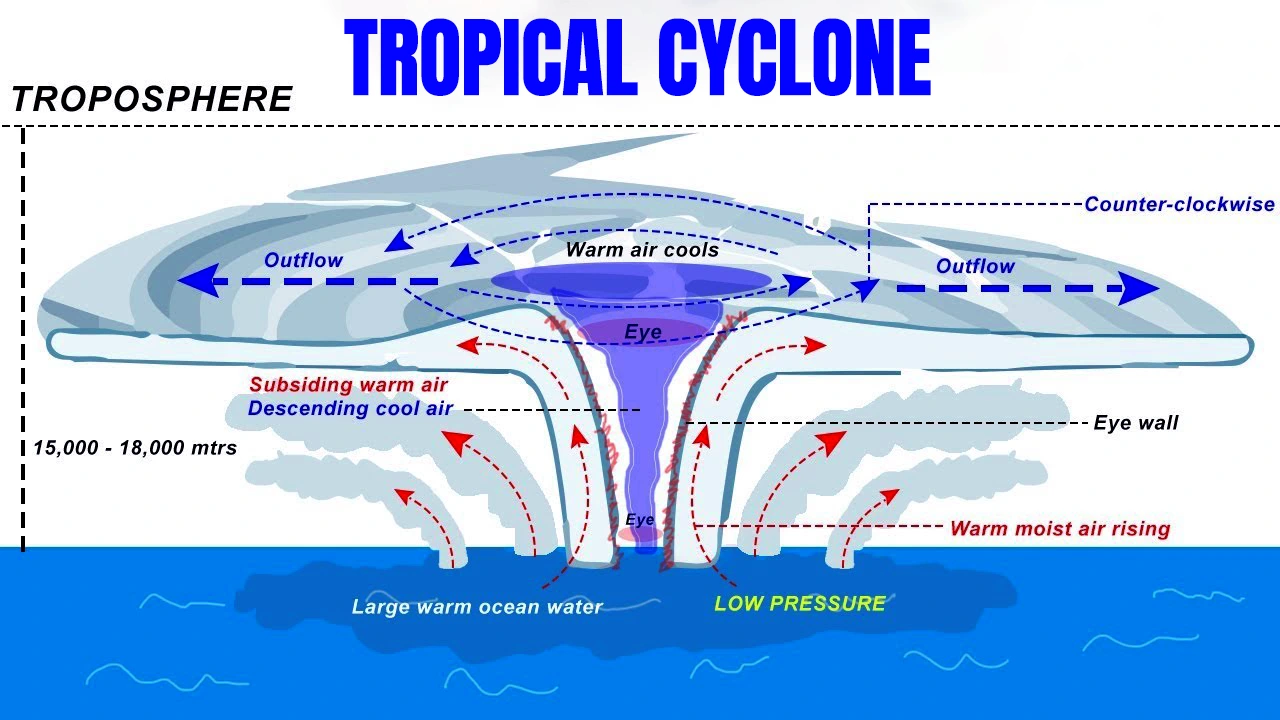Context: The India Meteorological Department (IMD) has forecast a cyclonic storm, Cyclone Michaung, over the southwest Bay of Bengal.
About Cyclone Michaung
- The Government agency has issued an ‘orange’ alert over Tamil Nadu and coastal and interior Andhra Pradesh.
- It is likely to make landfall in the coastal districts of Tamil Nadu and Andhra Pradesh.
- Michaung’ is a name provided by Myanmar. It means strength and resilience.
- Cyclone Michaung is the fourth tropical cyclone of the year over the Bay of Bengal.
What is Landfall?
- Landfall refers to the center of a storm – or its eye – moving overland from the sea.
- Landfalls can last for a few hours, with their exact duration depending on the speed of the winds and the size of the storm system.
Orange Alert:
- It is issued as a warning of extremely bad weather with the potential of disruption in commute with road and rail closures, and interruption of power supply.
|
What are the tropical cyclones?
- Tropical cyclones develop in the regions between the Tropics of Capricorn and Cancer.
- The World Meteorological Organisation (WMO, 1976) uses the term ‘Tropical Cyclone’ to cover weather systems where winds exceed ‘Gale Force’ (minimum of 34 knots or 63 kph).
- A mature tropical cyclone is characterized by the strong spirally circulating wind around the center, called the eye.
- Tropical cyclones have different names depending on their location and strength.
- For instance, they are known as hurricanes in the Caribbean Sea, the Gulf of Mexico, the North Atlantic Ocean and the eastern and central North Pacific Ocean. In the western North Pacific, they are called typhoons.

What are the conditions required for the formation of tropical storms?”
- Large sea surface with a temperature higher than 27° C;
- Presence of the Coriolis force;
- Small variations in the vertical wind speed;
- A pre-existing weak low-pressure area or low-level-cyclonic circulation;
- Upper divergence above the sea level system.
How are Cyclones formed?
- The development cycle of tropical cyclones may be divided into three stages:
- Formation and Initial Development Stage: The formation and initial development of a cyclonic storm depends upon various conditions. These are
- A warm sea (a temperature above 26 degrees Celsius to a depth of 60 m) with abundant and turbulent water vapor transfer to the overlying atmosphere by evaporation.
- Atmospheric instability encourages the formation of massive vertical cumulus clouds due to convection with condensation of rising air above the ocean surface.
- Mature Phase: Air rises and tends to spread out at the tropopause level. The air warms up by compression, generating a warm ‘Eye’.
- Modification and Decay: Cyclone begins to weaken as its warm, moist air source begins to ebb or is abruptly cut off. This happens after its landfall or when it passes over cold waters.
Also Read: Cyclone Midhili
News Source: The Indian Express
![]() 2 Dec 2023
2 Dec 2023

